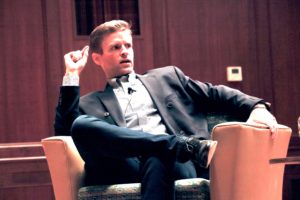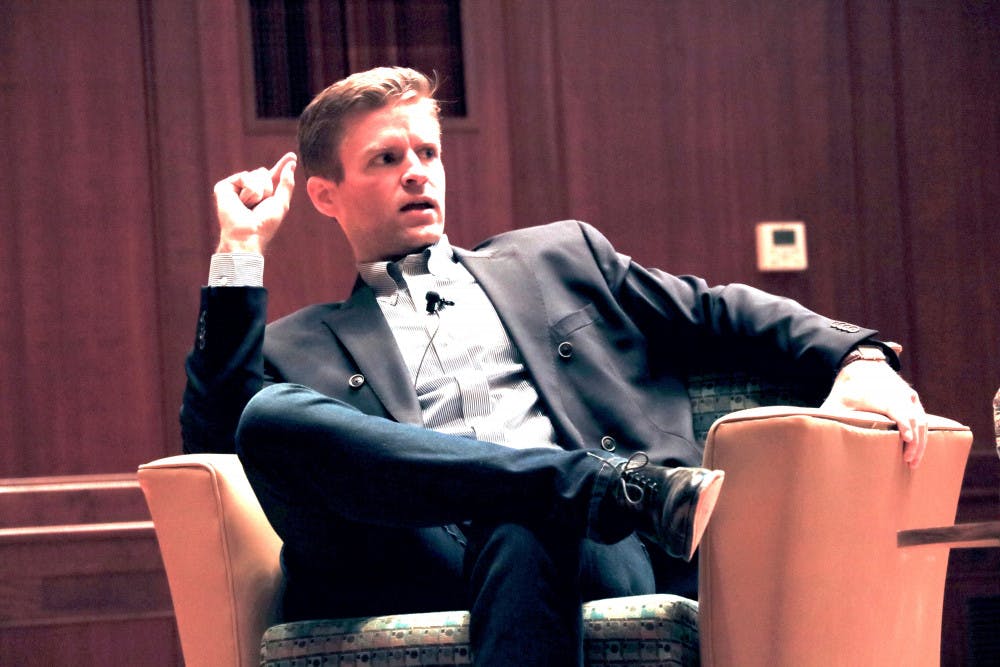By Camille Furst
News Editor

Students and faculty gathered in Mayo Concert Hall on April 17 at 4 p.m. to hear what College alumnus Bryan Faller (’09) had to say.
When Faller attended the College, he switched his major from biology to art and art history, which helped him garner a wide range of skills and use the interdisciplinary knowledge to his advantage. Now working in New York City as a professional art investor and financial advisor, he stresses the importance of interdisciplinary thinking, both in college and throughout one’s career.
Faller said that he was able to use his degree in art history and his M.B.A. from Rutgers Business School to combine all of his interests and turn his passion into a career.
“I love biology, but … I realized there’s a whole other set of skills that I’d like to explore before taking on that vocation,” he said. “How am I going to create an experience where I’m educated (and) explore all of those concepts? Who do I want to be and how do I get there?”
His parents were not supportive of the switch at first. Coming from a family deeply involved in business and finance, Faller said his parents were “horrified” when he first told them he was switching to a major in art and art history, but he did not let that stop him.
He then explained why majoring in art and its potential for interdisciplinary studies would grant him more fulfillment down the road. By combining business with art, he was able to succeed in expanding his academic horizons, which allowed him to achieve a career down the road.
“It was a much richer conversation for me,” Faller said. “I think biology is a very rich conversation … but to have something so interdisciplinary — you’re reaching from history, you’re reaching from politics, you’re reaching from engineering, marketing … (it’s) a much more engaging experience.”
Throughout the discussion, Faller noted similarities between the art industry and the other industries, such as business and biology — specifically, the way in which each industry has its own distinct disciplines.
He presented different works of art with which he has dealt and emphasized the need to see each work as separate and distinct, which he equated to other industries outside of art.
“Each artist and each work is its own separate discipline,” Faller said. “Each group, each artist, each market is completely different — the same way that the energy markets are different, the bio markets are different, aerospace … so as an investor, it was a very easy translation from art history. You’re able to translate across disciplines.”
Although he focused on interdisciplinary studies throughout his time at the College, Faller attributed his most valuable job experience to his time working at Starbucks when he was getting his M.B.A from the Rutgers Business School.
“I got a job at Starbucks because I was so poor and didn’t know what to do,” he said. “I never learned more than working at Starbucks. I never worked harder for $9 an hour. I think it’s important — learning about business, people, being kind to people. It’s exceptionally important because it doesn’t end.”
Faller then opened up the conversation and began taking questions from the audience. Many students who had questions at the discussion were art majors.
One student, Haley Mosseri, a junior fine arts major, sought advice from Faller concerning the business side of the art industry.
In response to questions concerning the convergence of art and business, Faller stressed the importance of studying business to anyone interested in pursuing fine arts.
“I thought it was really eye-opening because as a fine art major I’m more focused on the art side, whereas I hadn’t really thought as much about the economics and business side,” Mosseri said. “Seeing how important that is, I want to make sure that before I graduate, I get more of an understanding on the business aspect of the art market.”
Freshman history and secondary education dual major Lucy Fleischmann also found Faller’s points to be eye-opening.
“A lot of times, society sees people as either science and business or humanities,” Fleischmann said. “I think this was a great example of (how) you can do both and you can succeed with both.”
Faller left the audience with one last piece of advice — to “get comfortable being uncomfortable.”
“Know your limits, but knowing this is uncharted territory — that’s where the value is,” he said. “We all are constantly struggling in the world. There’s a struggle to be interesting enough. I want you guys as students to be able to talk, to have a conversation, to engage across disciplines. It’s being able to be outside of yourself, and to have … enough insight to say, ‘I need to change. I need to grow. I need to evolve.’”










